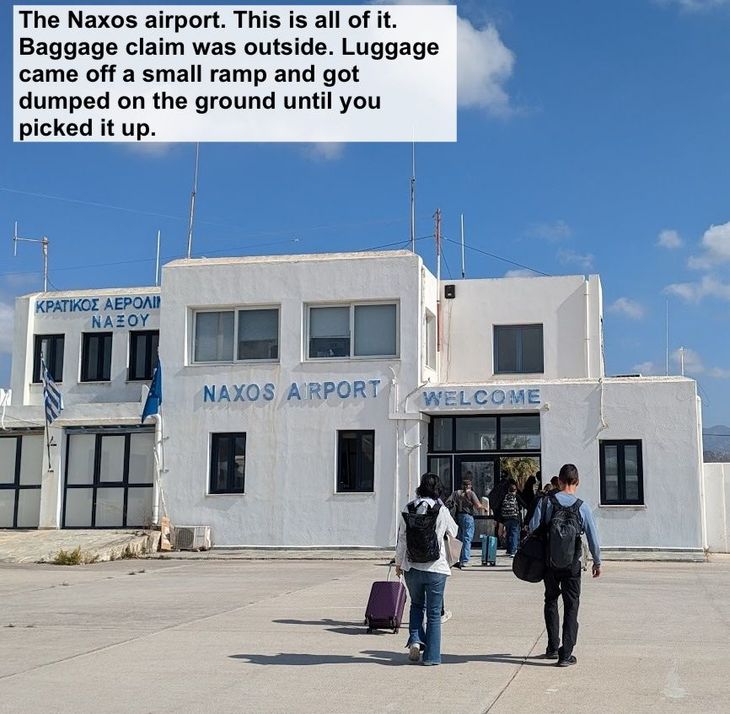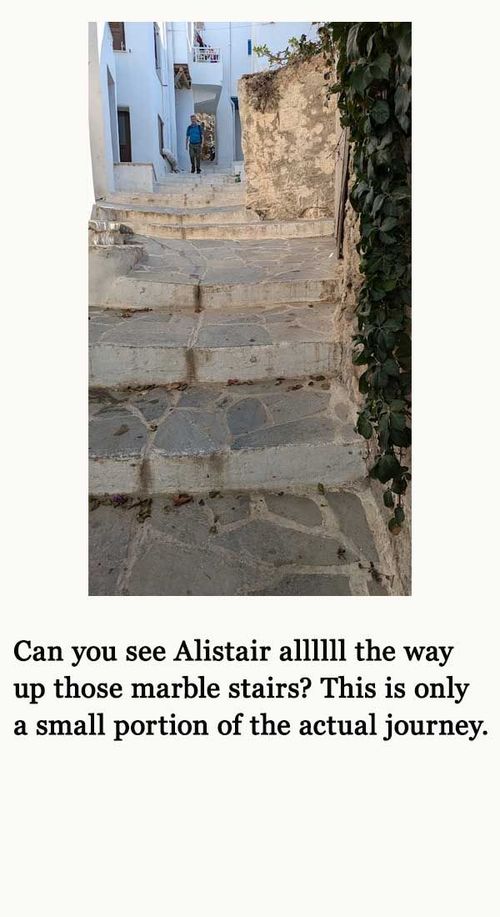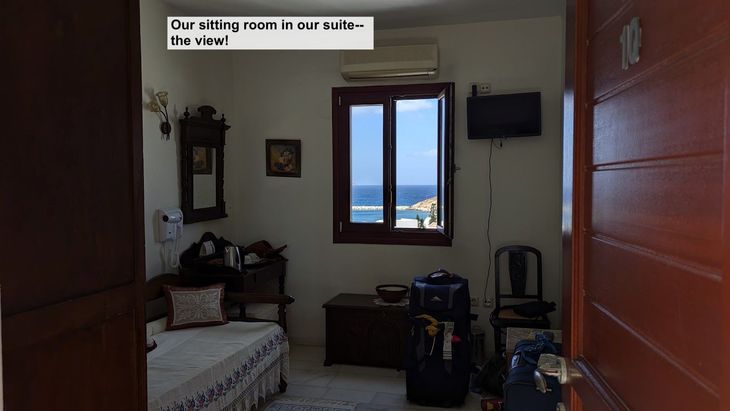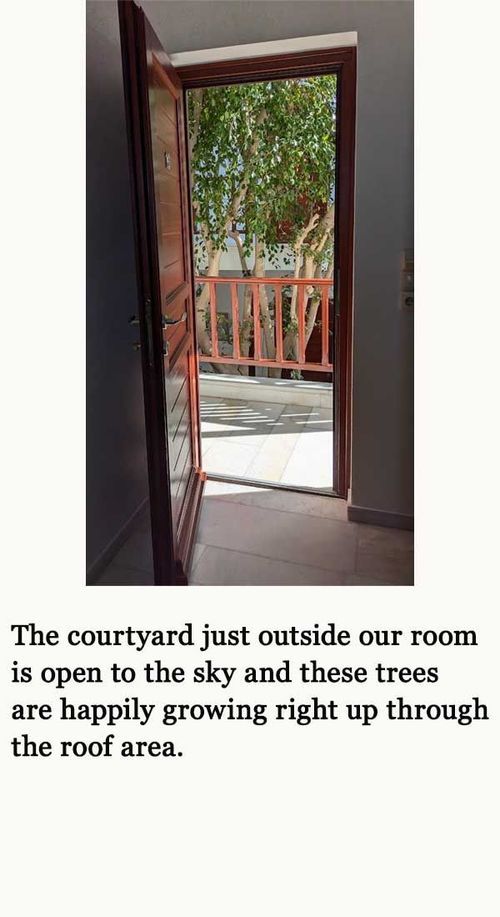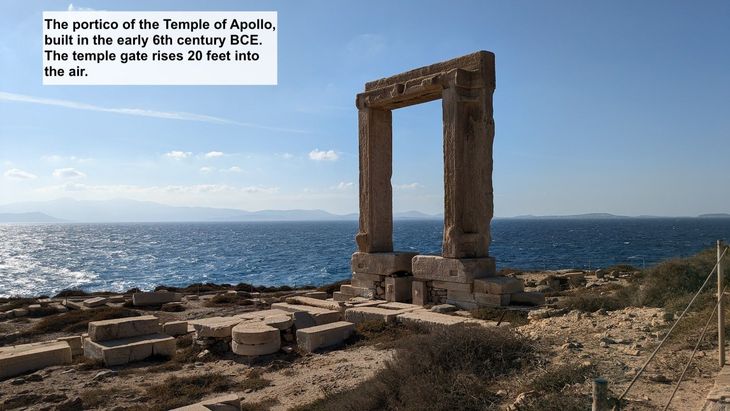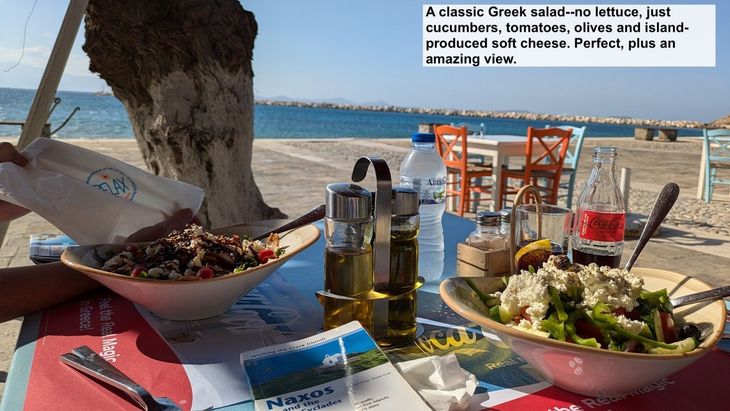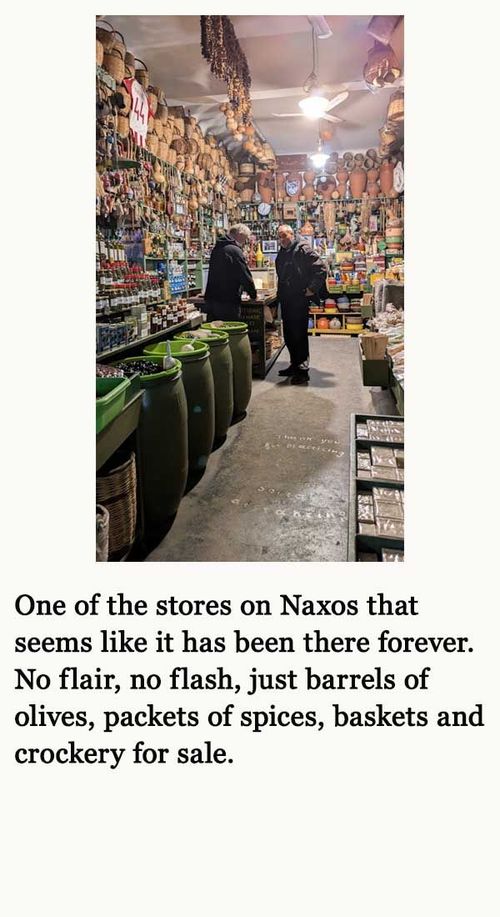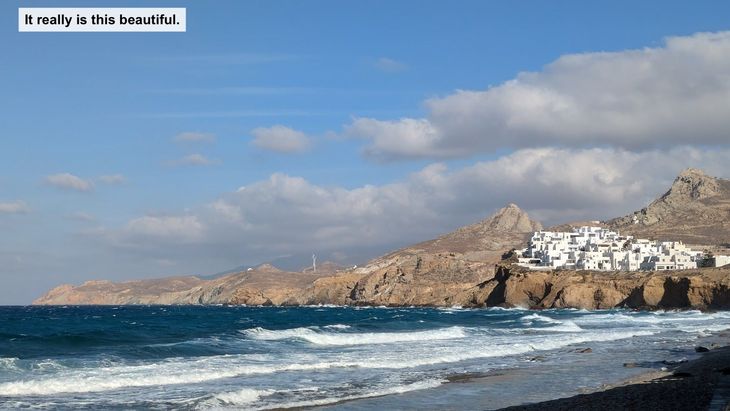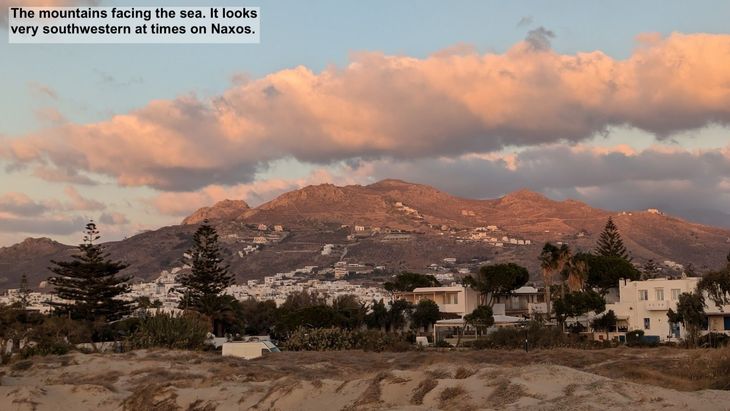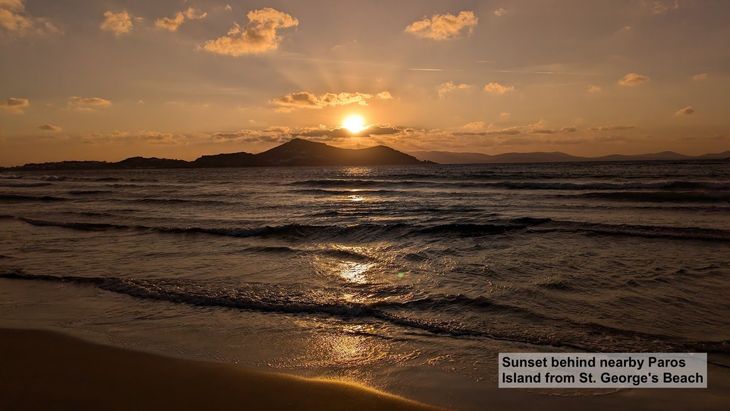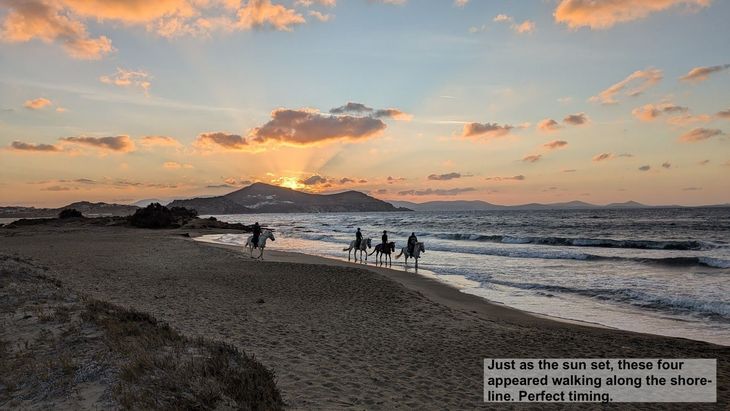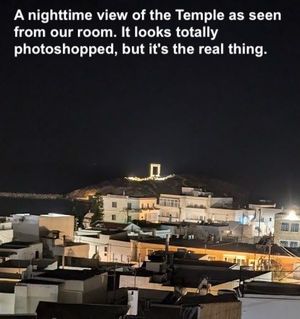48 Blog Post, Thursday, October 24, 2024 “Footprints in the Sand"
Pangiottis, our Uber driver, drove like a crazy man through the streets of Athens, talking to us animatedly the entire time. At the age of 60, he has seen many changes in Athens, and the amount of traffic is one of them. The 2004 Olympics created a whole new buzz in the city, and the airport was actually moved from the south, near the port, to the north, where there is more room. A new highway to get to the new airport was also built, and it was nearly empty when we got to it. But the downtown city streets were just packed with cars driving every which way, double-parked, inching across intersections. We were glad we weren’t driving!
This is one of the blessings of this journey. We are being nourished as we meet other people and intersect with their lives, even briefly. Pangiottis had lots of stories to tell and he had suggestions for us. “Go to the cemetery,” he told us, referring to the oldest cemetery in Athens. What a brilliant way to learn about the people who lived there. He told us that there are tours given to tell some of the stories. Interestingly, we never saw a single cemetery the entire time we were in Athens.
From there, we took a small plane for a 30 minute ride to the Island of Naxos, one of the Cyclades Islands, a group of about 220 islands grouped together because they circle the sacred island of Delos. Naxos is the largest of the Cyclades, and Syros is the most populous. Naxos feels like a ‘homestyle’ island, low key and affordable. Other islands like Mykonos are known as ‘party islands’ because of their nightlife. We haven’t seen any evidence of that here. Maybe we could call it Feline Island because once again, cats totally rule the day here and they are ubiquitous, sleeping in potted plants, strolling along the marble pathways, sitting in the dunes near the beach, dashing across the street in advance of cars.
This specific part of the trip is the fulfillment of a dream I have had for years. I remember watching a movie that was filmed in Greece about 40 years ago, and that film created the desire to come here, to swim (not sure about this part), to see the Sea with my own eyes. It is different than our dark blue, brooding Atlantic. The water here is full of light and color that varies with the angle of the sun and the time of day. Visiting a Greek Island has always sounded so exotic and beautiful, and it absolutely is, as my pictures will show you. But of course it is so much more, and so much less.
How is it less? I don’t mean ‘less’ in a bad way. I mean that this island exists because there people live here, their children go to school, craftspeople work and make a living. The grand sweep of physical beauty is astonishing to visitors like me, but for people who live here, it is what they know. We are also here outside of tourist season and many of the restaurants and shops are now closed until April of 2025. Not a bad life, right? That means that there are no lines, no packed restaurants or beaches. We have free rein of any place we want to go.
How is it more? The Aegean Sea is impossible to capture on camera. The brilliant blues, the wash of the waves, the nearby mountains on the Island of Paros are painted in colors that a cell phone will never reproduce, but of course I tried! We watched kite surfers move across the surface of the sea, which is wild today, at incredible speeds, doing more flying than sailing. The wind was like an additional dimension. At times it was hard to stand against it. That prevented me from even thinking about swimming, although there were a few people who braved the cool temps and the sharp breeze and went swimming anyhow.
We also have the most wonderful suite of rooms here in an old, traditional hotel, built at the turn of the century but well updated since then. Chateau Zevgoli only has 12 guest rooms. Ours is up three flights of marble stairs—no elevators here! I want you to imagine the Big Suitcases and their final journeys on these two islands of Greece, Naxos and Santorini, that are known for narrow stairways and alleyways. As there are no cars in the Old City, which is typical of many European historic centers, we had to drag the Big Cases up to the Hotel, and then up the stairs to our room.
We have our travel agent, Jean, to thank for this room. She has stayed here herself, and suggested we stay here as well. We now pass that info along to anyone else who might travel this way. It embodies a kind of old-world, colonial charm. From our windows, we can clearly see the remains of the Temple of Apollo on a nearby hill and we have our own terrace, large enough to hold a Vestry meeting. Hmmm….if I could only figure out how to get them here.
From our room, if we open the windows, the smell of the sea rushes in and we can hear the crash of the waves on both sides of the nearby peninsula. I will love falling asleep with that sound as my lullaby.
We spent time tonight walking. Our first stop was the Temple of Apollo which was never finished. The project was started in the 6th Century BCE and this enormous gate is all that remains. Each marble section weighs at least 20 tons. The Temple creates a stunning frame for the nearby sea and for the sunset beyond it, which some have said is the most beautiful sunset in all of Greece.
Then we hit the beach. This is the first real beach we have seen in our travels, except for the beach at Minori in Italy. But that was tiny compared to the shoreline of Naxos. The big beach near us is St. George’s and we managed to see our first sunset while walking along the shore. The sun sets behind the nearby mountainous island of Paros, so it gets dark earlier, but the sky was spectacular—mauve, peach, and shades of pink and blue reflected on the clouds just above the horizon.
We walked home through the back streets of Naxos and were surprised to see so many diverse shops along the way. I saw one man making sandals in his shop, and in another, it felt like we had gone back in time because it was like an old market stall with fresh herbs and spices and open barrels of olives. I always feel a little guilty when I take pics of shops like that, like I’m capturing something that they don’t necessarily want on film. But I want to capture the difference here, where things feel more homegrown than they did in Italy. WE even found another bakery with varieties of baklava—talk about indulgent!
Naxos is also known for its 30+ varieties of cheese, and we tasted two today, a soft cheese much like ricotta or whipped feta and a mild goat cheese. Rather than going to a restaurant, we bought a freshly baked loaf of rustic bread, a pack of olives, a little jar of jelly and a tiny bottle of ouzo for one—me. After walking we loved setting up an impromptu meal, with homemade baklava for dessert in our suite. Yep, this really IS living the dream.
Unfortunately, we think we need to find a local clinic for me to visit which will put a damper on things tomorrow. Despite taking medication, my lungs feel tight and unrelenting, keeping me awake at night, and then there’s that whole coughing thing. I’m more annoyed than anything else, to be honest, but we are also feeling concerned that I am not getting any better. Could I wait another week till I get home? We aren’t sure, which is why we will take on yet another part of the sabbatical adventure called “How does the medical system work on a relatively remote island in the middle of the Aegean Sea?” I guess we’ll be able to tell you the story!
Every time we disembark from yet another plane or train or metro and settle into a city or town, I become besotted, which means that I sort of fall in love with places and people quickly. I particularly love places that allow us to hike and be physically active, although I currently cannot run because of my lungs. But basic hiking and walking seems to be ok. So after just 8 hours in Naxos, I’ve done it again—fallen in love with another place where God has so generously allowed us to plant ourselves temporarily. I love the freshness of the air, the open sky above the sea, the sunset—the last time we saw a sunset was in Venice. I love the food, as we all know, other than octopus, which has been the most common seafood on the menu in both southern Italy and now Greece. I’ve learned to say “No chtapodi” and “No kreas”—no octopus and no meat, please.
Maybe the cooler than expected weather is getting us ready to go home. But I honestly hope it changes and becomes warmer again, and I hope that the wind dies down a bit so that we can be outside more easily. This island has many hiking paths, and my hope is to take advantage of that. But first….the clinic. Darn it.
I’ll close with a section of prayer from Morning Prayer in the Book of Common Prayer that I always love to say when the weather becomes wild, or in this case, when the sea sprays over its boundaries and crashes over jetties and walls:
Glorify the Lord, you angels and all powers of the Lord, *
O heavens and all waters above the heavens.
Sun and moon and stars of the sky, glorify the Lord, *
praise him and highly exalt him for ever.
Glorify the Lord, O springs of water, seas, and streams, *
O whales and all that move in the waters.
All birds of the air, glorify the Lord, *
praise him and highly exalt him for ever.
Sometimes we are nourished by recognizing that we are not the most powerful part of our environment. Standing by the enormity of the Aegean Sea, I was aware of its power, and of my smallness next to it.
What part of God’s creation seems powerful to you, and are you nourished by it, or overwhelmed by it?
Blessings and grace,
ML+

